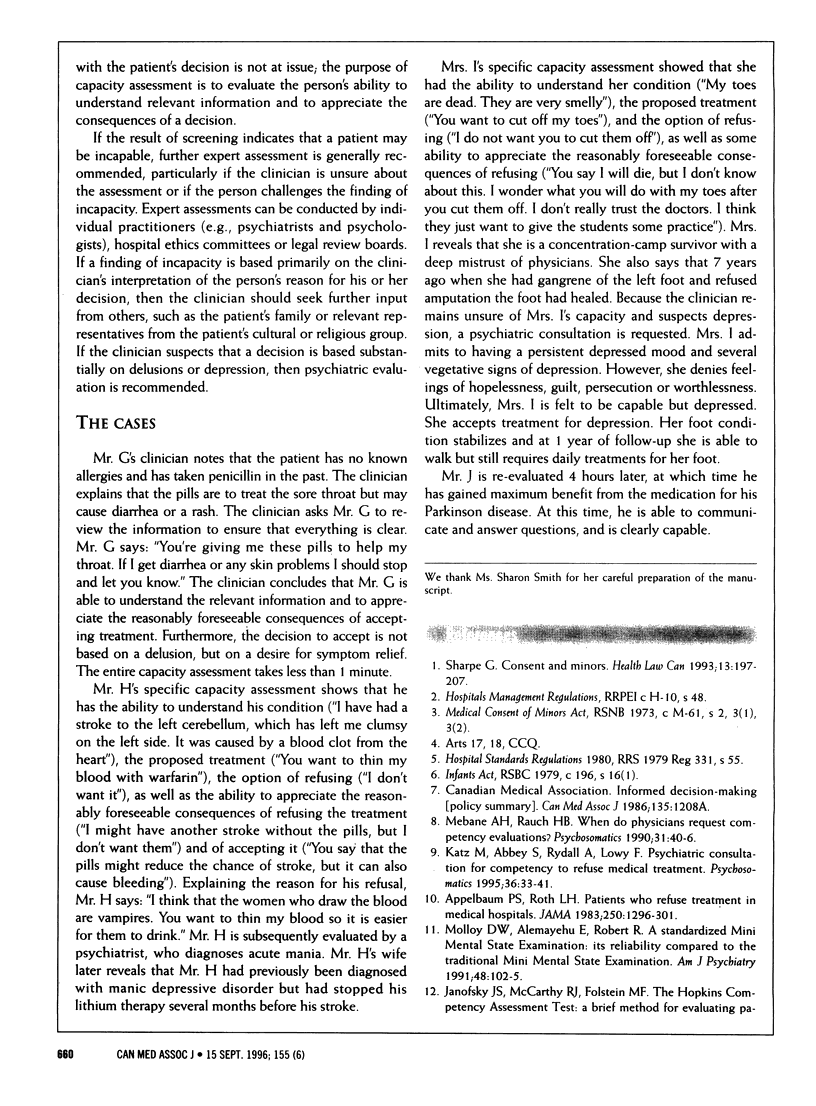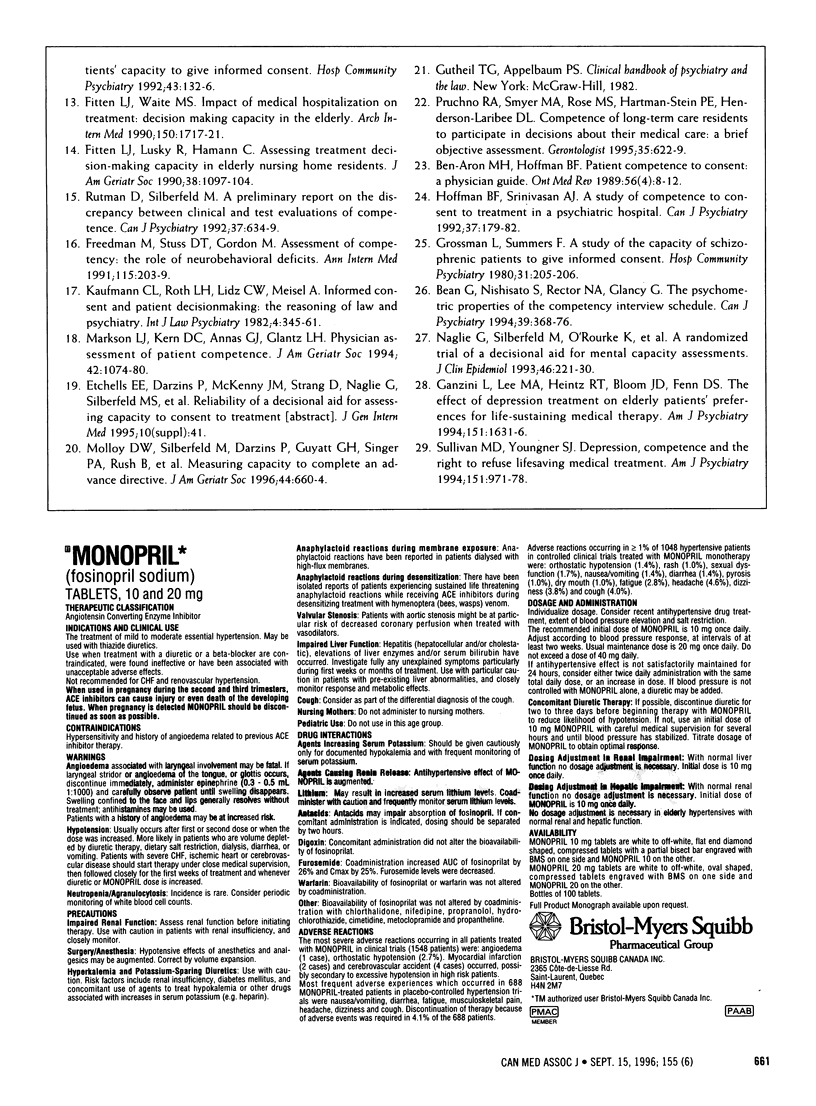Abstract
In the context of patient consent, "capacity" refers to the patient's ability to understand information relevant to a treatment decision and to appreciate the reasonably foreseeable consequences of a decision or lack of decision. A person may be "capable" with respect to one decision but not with respect to another. Clinicians can usually identify patients who are clearly capable or incapable, but in some cases a clinical capacity assessment is required. Such assessment may consist of cognitive status testing, general impressions of capacity or specific capacity assessment. Specific capacity assessment, in which the clinician evaluates the patient's ability to understand pertinent information and appreciate its implications, is probably the optimal method. When conducting a specific capacity assessment, the clinician must ensure that the disclosure of information is effective and must evaluate the patient's reason for his or her decision. If the assessment suggests that the patient is incapable, further assessment is generally recommended.
Full text
PDF




Selected References
These references are in PubMed. This may not be the complete list of references from this article.
- Appelbaum P. S., Roth L. H. Patients who refuse treatment in medical hospitals. JAMA. 1983 Sep 9;250(10):1296–1301. [PubMed] [Google Scholar]
- Bean G., Nishisato S., Rector N. A., Glancy G. The psychometric properties of the Competency Interview Schedule. Can J Psychiatry. 1994 Oct;39(8):368–376. doi: 10.1177/070674379403900804. [DOI] [PubMed] [Google Scholar]
- Fitten L. J., Lusky R., Hamann C. Assessing treatment decision-making capacity in elderly nursing home residents. J Am Geriatr Soc. 1990 Oct;38(10):1097–1104. doi: 10.1111/j.1532-5415.1990.tb01372.x. [DOI] [PubMed] [Google Scholar]
- Fitten L. J., Waite M. S. Impact of medical hospitalization on treatment decision-making capacity in the elderly. Arch Intern Med. 1990 Aug;150(8):1717–1721. [PubMed] [Google Scholar]
- Freedman M., Stuss D. T., Gordon M. Assessment of competency: the role of neurobehavioral deficits. Ann Intern Med. 1991 Aug 1;115(3):203–208. doi: 10.7326/0003-4819-115-3-203. [DOI] [PubMed] [Google Scholar]
- Ganzini L., Lee M. A., Heintz R. T., Bloom J. D., Fenn D. S. The effect of depression treatment on elderly patients' preferences for life-sustaining medical therapy. Am J Psychiatry. 1994 Nov;151(11):1631–1636. doi: 10.1176/ajp.151.11.1631. [DOI] [PubMed] [Google Scholar]
- Hoffman B. F., Srinivasan J. A study of competence to consent to treatment in a psychiatric hospital. Can J Psychiatry. 1992 Apr;37(3):179–182. doi: 10.1177/070674379203700306. [DOI] [PubMed] [Google Scholar]
- Janofsky J. S., McCarthy R. J., Folstein M. F. The Hopkins Competency Assessment Test: a brief method for evaluating patients' capacity to give informed consent. Hosp Community Psychiatry. 1992 Feb;43(2):132–136. doi: 10.1176/ps.43.2.132. [DOI] [PubMed] [Google Scholar]
- Katz M., Abbey S., Rydall A., Lowy F. Psychiatric consultation for competency to refuse medical treatment. A retrospective study of patient characteristics and outcome. Psychosomatics. 1995 Jan-Feb;36(1):33–41. doi: 10.1016/S0033-3182(95)71705-4. [DOI] [PubMed] [Google Scholar]
- Kaufmann C. L., Roth L. H., Lidz C. W., Meisel A. Informed consent and patient decisionmaking: the reasoning of law and psychiatry. Int J Law Psychiatry. 1981;4(3-4):345–361. doi: 10.1016/0160-2527(81)90006-6. [DOI] [PubMed] [Google Scholar]
- Markson L. J., Kern D. C., Annas G. J., Glantz L. H. Physician assessment of patient competence. J Am Geriatr Soc. 1994 Oct;42(10):1074–1080. doi: 10.1111/j.1532-5415.1994.tb06212.x. [DOI] [PubMed] [Google Scholar]
- Mebane A. H., Rauch H. B. When do physicians request competency evaluations? Psychosomatics. 1990 Winter;31(1):40–46. doi: 10.1016/S0033-3182(90)72215-3. [DOI] [PubMed] [Google Scholar]
- Molloy D. W., Silberfeld M., Darzins P., Guyatt G. H., Singer P. A., Rush B., Bédard M., Strang D. Measuring capacity to complete an advance directive. J Am Geriatr Soc. 1996 Jun;44(6):660–664. doi: 10.1111/j.1532-5415.1996.tb01828.x. [DOI] [PubMed] [Google Scholar]
- Naglie G., Silberfeld M., O'Rourke K., Fried B., Corber W., Bombardier C., Detsky A. A randomized trial of a decisional aid for mental capacity assessments. J Clin Epidemiol. 1993 Mar;46(3):221–230. doi: 10.1016/0895-4356(93)90069-d. [DOI] [PubMed] [Google Scholar]
- Pruchno R. A., Smyer M. A., Rose M. S., Hartman-Stein P. E., Henderson-Laribee D. L. Competence of long-term care residents to participate in decisions about their medical care: a brief, objective assessment. Gerontologist. 1995 Oct;35(5):622–629. doi: 10.1093/geront/35.5.622. [DOI] [PubMed] [Google Scholar]
- Rutman D., Silberfeld M. A preliminary report on the discrepancy between clinical and test evaluations of competence. Can J Psychiatry. 1992 Nov;37(9):634–639. doi: 10.1177/070674379203700907. [DOI] [PubMed] [Google Scholar]
- Sharpe G. Consent and minors. Health Law Can. 1993;13(3):197–207. [PubMed] [Google Scholar]
- Sullivan M. D., Youngner S. J. Depression, competence, and the right to refuse lifesaving medical treatment. Am J Psychiatry. 1994 Jul;151(7):971–978. doi: 10.1176/ajp.151.7.971. [DOI] [PubMed] [Google Scholar]


